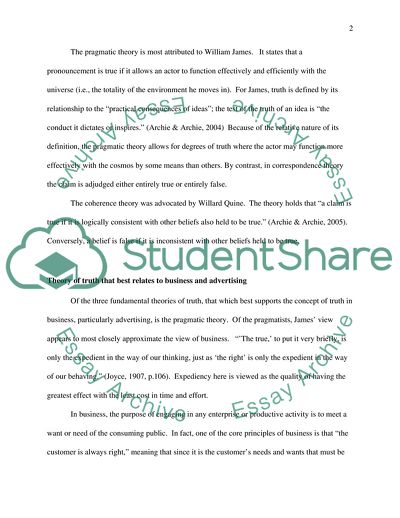Cite this document
(Theory of Truth in Business Assignment Example | Topics and Well Written Essays - 1250 words, n.d.)
Theory of Truth in Business Assignment Example | Topics and Well Written Essays - 1250 words. https://studentshare.org/philosophy/1757243-1-what-is-truth-which-theory-of-truth-do-you-believe-best-accounts-for-truth-as-it-is-understood-in-your-primary-field-of-study-compare-that-theory-with-at-least-one-other-theory-and-indicate-why-the-latter-is-less-satisfactory
Theory of Truth in Business Assignment Example | Topics and Well Written Essays - 1250 words. https://studentshare.org/philosophy/1757243-1-what-is-truth-which-theory-of-truth-do-you-believe-best-accounts-for-truth-as-it-is-understood-in-your-primary-field-of-study-compare-that-theory-with-at-least-one-other-theory-and-indicate-why-the-latter-is-less-satisfactory
(Theory of Truth in Business Assignment Example | Topics and Well Written Essays - 1250 Words)
Theory of Truth in Business Assignment Example | Topics and Well Written Essays - 1250 Words. https://studentshare.org/philosophy/1757243-1-what-is-truth-which-theory-of-truth-do-you-believe-best-accounts-for-truth-as-it-is-understood-in-your-primary-field-of-study-compare-that-theory-with-at-least-one-other-theory-and-indicate-why-the-latter-is-less-satisfactory.
Theory of Truth in Business Assignment Example | Topics and Well Written Essays - 1250 Words. https://studentshare.org/philosophy/1757243-1-what-is-truth-which-theory-of-truth-do-you-believe-best-accounts-for-truth-as-it-is-understood-in-your-primary-field-of-study-compare-that-theory-with-at-least-one-other-theory-and-indicate-why-the-latter-is-less-satisfactory.
“Theory of Truth in Business Assignment Example | Topics and Well Written Essays - 1250 Words”. https://studentshare.org/philosophy/1757243-1-what-is-truth-which-theory-of-truth-do-you-believe-best-accounts-for-truth-as-it-is-understood-in-your-primary-field-of-study-compare-that-theory-with-at-least-one-other-theory-and-indicate-why-the-latter-is-less-satisfactory.


